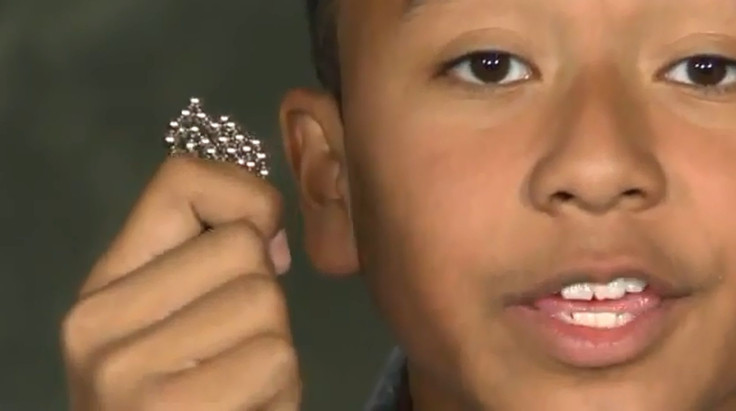Eating Magnets a Growing Danger: What to Do If Your Child Swallows Them? [VIDEO]

Eating magnets is a growing problem among young children, sometimes causing life-threatening problems when they stick to each other in the digestive tract.
It used to be that parents could simply wait for swallowed magnets to pass through their child's digestive system without complications, but the newer rare-earth magnets that have become popular lately are 10-20 times stronger than older ferrite magnets.
Because they are so powerful, two or more of these neodymium magnets can adhere to each other after being swallowed and cause bowel perforations or intestinal blockage.
High-powered neodymium ball magnets are marketed to adults as desk toys, and the danger they pose to small children is not new. The U.S. Consumer Product Safety Commission (CPSC) asked companies to stop selling the products last year, and the company Maxfield & Oberton Holdings discontinued their popular Buckyballs after several children swallowed the magnets and suffered injuries. Still, neodymium ball magnets are readily available online from other companies.
A new case study in the Canadian Medical Association Journal highlights the dangers of children swallowing magnets.
"Modern magnet technology has transformed what was once an esoteric subtype of foreign-body ingestion into a common and lethal threat," wrote Dr. Daniel Rosenfield of The Hospital for Sick Children (SickKids) in Toronto.
"Swallowing a single magnet is generally innocuous, much like swallowing any other inert foreign body. However, multiple magnets, especially when swallowed at different times, can attract each other through loops of the gastrointestinal tract. The force created through the bowel or stomach wall may result in pressure necrosis and eventual perforation."
Rosenfield and his team reviewed clinical literature to find that eating magnets, once a relatively rare problem, has become much more common as these rare-earth magnets have become more popular and easily available.
A 2012 North American survey of pediatric gastroenterologists reported 480 cases of children eating magnets over the past decades, and 204 of these cases occurred in the past 12 months.
Data from the Public Health Agency of Canada also shows that the number of emergency room visits to for swallowing magnets has increased significantly over the last decade.
Rosenfield also described the case of a 3-year-old child at their hospital who swallowed three small, round neodymium magnets. The child was taken to a doctor, but was sent home since he appeared to be in no pain.
The doctor told his parents to keep an eye out for the passage of the magnets in his stool, but after two days the magnets had still not passed. Laxatives did not help, and the boy developed a fever, abdominal pains, and increased heart rate. The boy was taken into surgery, where the surgeons found that the cluster of magnets was stuck together through loops of the lower intestine, and had eroded through the boy's intestinal walls.
Luckily, the boy made a full recovery after the surgery and the perforations healed.
So what can you do if your child (or anyone else around you, for that matter) is distressed after eating magnets?
The CPSC's first step is to seek medical attention immediately.
- Look for abdominal symptoms like pains, nausea, vomiting, and diarrhea.
- Seek an x-ray, and note that multiple magnetic pieces can appear as a single object when stuck together.
- If x-rays show the presence of more than one magnet, an intervention may be necessary to remove them. A laxative can help pass the magnets, but endoscopy or surgery may be necessary as a last resort.
Still, the best thing to do is to keep young children from eating magnets. If you have a set of high-powered ball magnets, make sure they are kept out of your children's reach, and that none are loose or missing. You should also inspect all your child's toys and play areas for missing or dislodged magnets.
Despite the dangers of children swallowing the magnets, they are not going anywhere. Warning labels are already required on the packaging of all magnet-based products, and rare earth magnets are banned for sale in children's toys.
The researchers suggest that doctors and health care centers warn parents of the risks of their child eating magnets, and stress the need for more targeted campaigns to inform parents.
The takeaway: Keep your children away from neodymium ball magnets. Swallowing the magnets can cause intestinal perforations, so the best thing to do if your child does eat them is to call 911 immediately.
Read the CPSC's warning about ball magnets for more information.



























